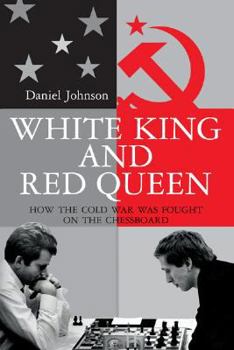White King and Red Queen: How the Cold War Was Fought on the Chessboard
Select Format
Select Condition 
Book Overview
Daniel Johnson -- journalist, editor, scholar, and chess enthusiast who once played Garry Kasparov to a draw in a simultaneous exhibition -- is the perfect guide to one of history's most remarkable... This description may be from another edition of this product.
Format:Hardcover
Language:English
ISBN:0547133375
ISBN13:9780547133379
Release Date:November 2008
Publisher:Mariner Books
Length:384 Pages
Weight:1.37 lbs.
Dimensions:1.2" x 6.0" x 9.0"
Customer Reviews
3 ratings
Chess as MORE than a metaphor for real life
Published by Thriftbooks.com User , 15 years ago
This was a most refreshing read! Subtitled "How the Cold War Was Fought on the Chessboard," this book describes how the Soviet Union made a conscious effort to promote chess as a propaganda weapon during the Cold War... and how the resulting "chess machine" was challenged by three very different threats that each portended the crack-up, not only of the USSR's dominance over world chess, but of the USSR itself. What makes the narrative -- which could have been quite dry and pedantic -- so powerful is the author's pronounced anti-Communist stance. No punches are pulled and no "moral equivalence" is tolerated. In his preface to the American edition, Johnson, a British reporter, notes that this uncompromising stance earned him some criticism when the book was published in the U.K. From my point of view, we should all have such detractors. The three aforementioned "threats" to post-WWII Soviet chess hegemony were Bobby Fischer, the troubled American genius who defeated champion Boris Spassky in a 1972 match that put chess on the front pages of the world's newspapers; Viktor Korchnoi, a Soviet defector who barely lost to Anatoly Karpov in a pair of contentious, occasionally bizarre matches in the late 1970s and early 1980s; and Garry Kasparov, who wrested the title from Karpov in 1985 -- though not without a fair share of controversy -- and gradually drifted from a supporter of Mikhail Gorbachev's reforms to outright opposition to the Communist regime, a position he has since maintained vis-a-vis Vladimir Putin of the Russian Federation. The Fischer story will be familiar to most American readers who are interested in chess and has been told in greater detail elsewhere, and Johnson plows relatively little new ground when discussing Fischer's career, his relationships with the world and the Soviet chess establishments, and the Fischer-Spassky match. Korchnoi and Kasparov, however, have never truly gotten their due in this country, and this book serves as a useful corrective. Korchnoi, in particular, may have been an even graver threat to the Soviets than Fischer, since he had been a well-established grandmaster in the USSR before falling afoul of the authorities and choosing to abandon the Soviet system in favor of the West. Paranoid and superstitious Korchnoi may have been, but the saying "Just because you're paranoid doesn't mean they're not out to get you" never contained more truth than it did in his case. Kasparov -- who's best known in this country for losing to the computer "Deep Blue" back in the 1990s -- was younger, much more of a "world citizen," and, once he made his break with the Communists, a much clearer indication that the regime that had nurtured his talents had lost the ability to control them for its own purposes. In between the sections dealing with Fischer, Korchnoi, and Kasparov, Johnson discusses such topics as the history of chess, the fates of post-Revolutionary emigrants from Russia, the fact that the vast majority of great
A veritable history of chess over the last 150 years
Published by Thriftbooks.com User , 16 years ago
A very fine work which provides an entertaining and quite detailed account of chess history over the last 150 years that have seen battles between American and European chess geniuses (for example Morphy triumphing over the European masters, the brilliant and tragic Pillsbury, the great Capablanca (undoubtedly the greatest genius ever to play chess), Reshevsky, and with special emphasis on the rise of Fischer, a player of indomintable will and genius and his ultimate triumph that catapulted him to the status as one of the greatest players to ever play the game. I highly recommend this book.
Chess with an edge
Published by Thriftbooks.com User , 16 years ago
Daniel Johnson has written about a fascinating era of chess with the gripping edge of a seasoned sportswriter, though he certainly hasn't had to lower himself into the ranks of such ink-stained wretches. His descriptions of the tension-filled scenarios are done with flair...even if you are not that interested in chess, this book entertains and informs at every turn. He's got the details down pat, introducing the novice reader to Mikhail Tal and Alan Turing and many other characters dotting the landscape of international chess.





